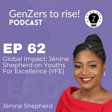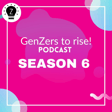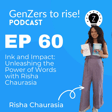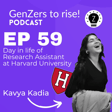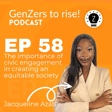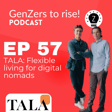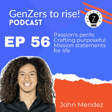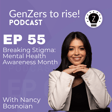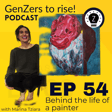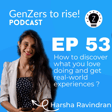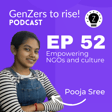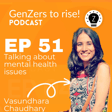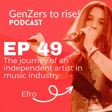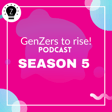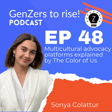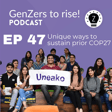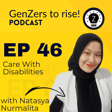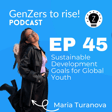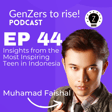Become a Creator today!Start creating today - Share your story with the world!
Start for free
00:00:00
00:00:01

How do we identify as genzers ?
The GenZers to rise! Podcast is back. For the very first episode of season 6, join us with Hamza Islam on a conversation that is all about "How do we identify as GenZers ?".
Hamza is the host of Oh My Curry Goodness podcast that is available to all the streaming platforms. Here are some insights of this episode:
- When we are running a show for GenZ, we tend to invite people of that generation to reflect on their journey. However, sometimes guests that represent another generation have a lot more to share on the table for some particular subjects. What do you think about that ?
- This podcast was created for GenZ, by GenZers and we are very proud of that. But, how do we identify as GenZers ? What do you believe ?
- It’s about the journey, not the destination. That’s the slogan of your show. Which is your favorite journey ?
- Among all the guests that you have featured on your show, what is that thing that they all have in common ? What do you believe ? For instance, our guests have been inspired by the potential of entrepreneurship while following their dreams, whatever it takes.
- What’s your favorite quote and why ?
Connect with Hamza Islam at https://lnkfi.re/hamza-islam
Follow GenZers to rise! https://go.changemakerz.org/follow
Visit the episode's page at https://podcast.changemakerz.org/hamza-islam
Access exclusive content on the ChangemakerZ app at https://app.changemakerz.org
Transcript
Introduction to Changemaker-Z
00:00:01
Speaker
Hello everyone, I'm Kennedy. And I'm Vasilis. We run Changemaker-Z, a student-run initiative that aims to empower, educate, and connect Gen Zers interested in entrepreneurship. We interview teenagers with impactful projects and create resources to help you change the world. If they can't do it, so can you. On this podcast, we discuss the logistics of creating different types of projects with Jin Ziers who have already done it. We will leave our social media and website information in the description.
00:00:38
Speaker
a are a
Guest Introduction: Hamza Islam
00:00:46
Speaker
Hey everyone! In today's episode, we are here with Hamza Islam, the host of Oh My Cowie Godness podcast. This episode is all about identifying as dancing. Hamza, welcome to the show, so nice to meet you. Thank you so much for having me. I've been following your podcast for a while and so to be here is this is really cool. Thank you so much for being with me today. um So to begin with, what is your podcast all about and how did you get started in general? now If you have any significant guests, I know that you have many episodes. So what's your favorite part of being a broadcaster in the end? Yeah, for sure. So I'll talk about my podcast. So my podcast is called Oh My Curry Goodness. And the essential the the reason I came up with that name is when we hear stories that are really interesting, we say, Oh My Goodness. And curry is one of my is my favorite food um as someone who's South Asian. So we we love to eat curry and I wanted to include a
00:01:45
Speaker
I want to include curry in the name and so sometimes when people say, sometimes people like to add more emphasis on the goodness part so like oh my freaking goodness or oh my insert word goodness so I thought oh my curry goodness would be a fun way to be amazed but also to be inspired in some in some
Authenticity in Storytelling: Beyond Success
00:02:04
Speaker
way. um I started this podcast back in January and I was always interested in learning about people's stories and getting to know the person behind the person. I find that a lot of podcasts interview people or talk to people because of the work that they're doing or highlighting their accomplishments and i think that's really good and that's something i know that a lot of people would love to have at some point in the future but i really want to focus on the vulnerability the authenticity the the the the the the the the human.
00:02:33
Speaker
like the human element because what people don't get to understand much is those challenges and obstacles and the experiences that shape a person into who they are today so i want to focus on that as much as possible and like you said i brought a lot of jenzy guess i want to focus on jenzy because i think our generation has started the conversation about being vulnerable, being authentic, but we haven't done too much of that. So I want to e that i want to be the person that's being that's going to let people share their stories in a unique way. and
00:03:08
Speaker
That is so true. like Whenever we have a guest, and were really represent no we what they represent. represent We represent their project. Always we talk about no challenges, what is difficult, how we achieve it. But you are right. I don't think that a listener from another place in the world can really understand those challenges and because maybe they never get into the idea to try the same thing or i don't know for instance you're creating a company and you have to do some legal stuff and what we're talking about you know a non-profit organization it has to to follow those those those guidelines and so in the podcast we present this.
00:03:54
Speaker
But no one is going to get into that. So what do you propose so that we can experience as listeners of Gen Z podcasts those, you know, mementos, like those, ah those, those difficulties that an entrepreneur, an entrepreneur, someone is experiencing when, you know, doing some business, a project, anything. Yeah, and those challenges and experiences are need to be talked about because it's relatable to everybody. um Not everyone can relate to the success being recognized by an organization company, speaking at the United Nations or speaking at a TED conference. It's really important to talk about those challenges and obstacles because
00:04:41
Speaker
when we are not on when the doors are closed and when no one really so gets to like no one else no one like i won't to be able to understand you nor will you be able to understand me you can understand as much as possible but you'll never understand the full story and so we will face when when what people don't see is we face more challenges than success and so being able to talk about these things gives listeners hope and knowing that even though you have different challenges, regardless of what they look like, that you're able to have the tools or experiences that can shape you into becoming a better person today. And that's why I believe having these conversations is important. And especially with Gen Z, we do, we I think we care more about, unfortunately, we care more about the success.
00:05:25
Speaker
six success stories as opposed to like the the daily grind. And I think we need to talk about that because that's actually the success is 1% of the person's story. 99% of the story is the absolute the actual grind and the things that you normally don't want to post about but or talk about but need to because that's actually part of the job regardless of what field you're pursuing. I agree with you 100%.
Podcasts and Video: A New Trend?
00:05:55
Speaker
Now I was thinking, since like we received the Spotify rub for broadcasters, artists, whoever uses Spotify, you know different decides about a slow
00:06:07
Speaker
i was i was you know I was introduced to the fact that for the Genji Stress Podcast, then 99% of the listeners came thanks to one single episode that was recorded two and a half years ago. And that's thanks to the guest that was too famous. It's the turning a creative passion into a successful career with Gox, Gox is a successful YouTuber, and an artist from New Mexico and so all of these people are coming from this episode and then they you know discover new things new topics that they never thought before but on the same time I saw on you know the different analytics that people tend to visit this episode because it has an idea of being a video without being a video production
00:07:01
Speaker
And probably with a new trend of podcasts being transformed to videos, I don't know, maybe a broadcaster will become YouTubers, since it's going to be, you know, exactly the same things, but it's more brutal. You know, it's not a really, really hard editing. It's not with so many effects because usually a podcast is a conversation, is a story, or is no commenting on things. What do you believe in that? um Like the idea of transitioning to Yes, I yeah, that's a really good question and I actually for my podcast I do video episodes as well um I think it's a really good idea because For one when people don't know who you are. They want to be able to know what you look like So because people not everyone knows who Hamza Islam is so being able to have a video podcast allows you to understand Okay, what the person looks like?
00:07:58
Speaker
And then also you know you've like yourself you've been able to interview a lot of incredible people but at the same time not everyone knows who that person is so having that video that video episode. Can i give people an idea of what they look like and then maybe they might want to follow their stuff more. however its However, I do also and think that there is this misconception that because when you think of video, you think of YouTube. And so now your identity is more of like a YouTuber. People will think that you're now a YouTuber instead of a podcaster, but that's not entirely true.
00:08:32
Speaker
So it's it's one of those things where because it's a new ah it's something new that it's something we're seeing now, I think it's going to take some time before people understand that there's a difference between a YouTuber and a podcaster, but I still like the idea. However, I will say one drawback of the podcast, and maybe because I'm very, very, very critical in myself, I don't know if this is something you experience as well, but sometimes When you have video, you you can see people's backgrounds, you can see people you can see people's faces, and sometimes you might have one thing that might ruin the entire experience. Whether you're talking and then as you're looking through the video, you might see that you have like a lettuce stuck in your tooth and you didn't realize that until after the video or after ah once while you're editing the video. So now you're like, oh my gosh,
00:09:24
Speaker
There's a lettuce on my there's like a piece of food on my tooth and it looks embarrassing, but um I think at the end of the day, um you know I can understand people's versions of like whether they prefer audio or video, but I think having video gives you that sense of what who who the people are. and then I don't know. I think once you see them, you're more likely to be more interested in what they have to say. so um I get some people think of podcasts as an audio version, but I also like the in-person thing because it's it's literally real. I see what you're talking about, and I agree with you.
00:10:03
Speaker
First of all, i I found that it's really difficult if you want you know to be so consistent and have the best quality ever to release a lot of content on podcast and while while you know it's also video production. Because in the end all of this content needs to be edited in the end and be released, broadcasted with whatever means. On the same time, ah thanks to the fact that the YouTube is the second largest you know search engine.
00:10:41
Speaker
that's I think that's the reason why people tend to say, okay, you're doing a video, you're a YouTuber. But I agree to the point that a YouTuber and a podcaster is totally different things. A YouTuber is a personality. is a personality that represents different things and presents videos and subjects with their own point of view. A podcaster can be this thing and many other things at the same time. If you are having, I don't know, a criminal podcast and you say stories or you read books, ah that's something really different from the idea of being a YouTuber in general. It's more like to the idea of
00:11:25
Speaker
having an audiobook listening but it's a podcast and here we're having a conversation we talk about things it's more like an interview but it's not a real interview it's it's a conversation in the end people talking talk about things that they are interested into that so i think that what identifies a podcast is a fact that there is this human factor that exists and co-exists in every level and aspect of every production. While on YouTube, some YouTubers are really authentic, but there are also other many YouTubers that they are not so authentic, and they are just following trends, promoting content. The same goes for podcasts about you know advertising, things like that, but I don't think that's exactly the same thing, and thanks for mentioning that.
00:12:15
Speaker
Yeah, one thing I'll add into that, I think you said it really perfectly, which is the fact that YouTubers, again, they there are authentic YouTubers, they're able to share that vulnerability, but it's mostly they want to follow this some sort of trend. And I don't blame them because I can understand why people want to do this because it's not... That's their profit. Yeah, exactly. That's their profit. And maybe that's that's something really interesting. A YouTuber nowadays is considered to be a profession, like a job for for many of people around the world. For podcasters, it's only for the 1% of the podcasters because a podcast for someone something that's a hobby, doing their free time, they want to have an impact on the world. The profit wasn't you know their first goal when they started the podcast.
00:13:03
Speaker
If they want to expand it, of course, they are going to assign contracts, of advertisements, etc. But also this is something that differentiates YouTubers from podcasters. Yeah, and I'll say like YouTubers, they they focus more on that trend. And I think like YouTubers and podcasters can sometimes fall in the same category, like there's a lot of similarities. But I think going back to what you're saying, and you said it's so so true, which is that podcasters more so focuses on the conversation and like the those real conversations. And I think we see more of that on podcasters as opposed to YouTubers.
00:13:40
Speaker
but Like i said you can see that happening frequently between podcasters and youtubers what i've noticed is that yeah if you want to differentiate between the two. You see a lot more conversation based stuff from podcasting and more content creating. When it comes to like you so both is entertainment but there are different kinds of entertainment it's like when you go to YouTube to search for a Ted video but Ted we did something more than entertainment to learn about things it's an open an open conference available in hundreds of
00:14:17
Speaker
languages accessible to everyone so maybe maybe it's not the people or how they are creating content but in the end maybe they are the platforms that they differentiate people you know like podcasters were exclusively on spotify apple podcasts and now they tend to become part
Gen Z's Impact-Driven Mindset
00:14:37
Speaker
of youtube because google decided one day to close their program of google podcasts because Do you have to know the profits that they want to and they said okay yeah let's transfer everything to youtube and it's being a video that it's not a video it's only audio but it exists on the youtube platform i don't know.
00:14:58
Speaker
Yeah, I will say the I think um because I think my podcast is on Spotify Apple podcast in YouTube. I think for our podcast. We want to reach as many people as possible. Yeah, and so I think it's a great sign, but I also think that. You know, my worry with people people think like, oh, now you're a YouTuber. It's like, no, I'm just full of podcasts. My intention is to share stories. And I'm not looking for like any sort of, I don't want to say clickbait or anything. I'm not trying to be like, oh, let me say something that can get people going. It's people want to hear the conversations because, again, of those that that storytelling or experience phase. Yeah, totally agree with you.
00:15:43
Speaker
When we are running a software Gen Z, we tend to invite people of you know that generation to reflect on their journey. However, sometimes guests that represent other generations have a lot more to share on the table for some particular subjects. So what do you think about that, according to your experience? Yeah, i I kind of go back and forth with this because my intention when I first started the podcast was to only speak to Gen Z. um And that was mostly because one, it was something I grew up, I had friends, but I didn't really get to hang out with them. Either know that was because of timing or I just didn't fit in their friend group. So this is something like, I guess this is a way to, I guess, quote unquote, hang out with people. And I also want to go back to the idea of
00:16:32
Speaker
Well, I want to share people's stories and experiences but and we see that from other gen or older generations, but we don't see that from our generation. So that's something I wanted to take into account. As far as the idea of bringing multiple or older generations, I think it's a great idea. And I think, you know, it's something that I've been looking into lately. Um, I just don't know when exactly cause I just want to focus on Gen Z at the moment. However, I think bringing in people from different generations whose purpose is to help other people is really important because for a lot of people, maybe they didn't get their success until later on in life and they might be able to teach you things much better than maybe what you've been used to learning, whether that be fear of judgment, of fear of, I don't know,
00:17:19
Speaker
fear of fear of judgment, fear of rejection, failure. I think they might have more experience compared to our generation because they've known more about it because they've lived long enough or longer. However, one thing I will say though, and a friend of mine told me about this when I was talking about bringing in multiple generations is the but make sure that if if you are going to bring someone from different generations, make sure the language is appropriate. appropriate And what I mean by that is their a way of life when they were 17 or 18 is much different from when we like we were 17 or 18. So if you bring someone who was born in 1950, their
00:17:57
Speaker
They were 18 or 19, like 1968, 1969. Their journey as a 19 year old will be vastly different than as Gen Z'ers. So the conversations will be a bit different, but it's not anyone's fault. It's just, again, those experiences and perspectives. So I think bringing multiple generations is is good um because there's a lot more information that they can teach and pass down to generations like ours, generations after us and so forth. But what I think will be really important is make sure that you do bring someone that can talk to a Gen Z'er in a way that it's almost like explain it like I'm five. That kind of thing. If you can't do that, then it's going to be a bit, it's going to be difficult to actually connect with those older generations.
00:18:42
Speaker
This podcast was created for Gen Z by Gen Zers and we are very proud of that. But how do we identify as Gen Zers? What do you believe? Yeah, this is when I saw this, I remember when you sent me this the question sheet and I had to really, really think about it because there's so many ways you can describe what makes Gen Z Gen Z. I think a couple of things that come to mind when it comes to how you describe Gen Z is
00:19:10
Speaker
Ooh, I feel like i'm gonna be this is going to sound controversial, but I think one thing that comes to mind is their emphasis on impact as opposed to income. I think that's one of the things that comes to mind because a lot of the people that either we've interviewed or we've probably seen in the news, whether that be Malala, Greta Thunberg, um
00:19:33
Speaker
There's more people i just I can't think of at the top of my head, but they care a lot about giving back and inspiring people and making an impact because they see a problem and they't want they want to address that issue. Now, unfortunately, there are people that will say, oh, what they're doing is bad or really, there's so many other things to focus on right now. We don't need to focus on this. But they care about it because they see that there are so many other Greta Thunberg's Malalas in the world that are not... That we don't see. Exactly. And they're not getting those that success. And not mean success not mean recognition, but success in education or their struggle, their suffering. All resources in the end.
00:20:13
Speaker
Exactly. And so I think I think Gen Zers focus a lot on impact as opposed to income because they want to make they care about money and and I want to be clear because I feel like in the past I've I've over underestimated the importance of income. You want to make sure that you have enough money to support yourself. But People want to focus on making people's day 1% better and you see a lot of people that's why you see a lot of people creating nonprofits being part of organizations whose mission is to address a certain issue or Tackle an issue because even though they may be in a place where they're doing better That there are people that are not they don't have those same resources And so to be able to make an impact in their day is really important um one other thing I would say is is ah
00:21:02
Speaker
I know this this is usually a bad word, but I think it's a good word in a sense, which is misunderstood. i think the and the reason And it goes back to the fact that the lot A lot of people that I've met on on my podcast will be open about how, even because of their age, they're usually talked down upon. So they'll they have this idea, but then they might go, oh, but you're too young. Or, okay, yeah, that's nice. We'll we'll we'll keep you we'll keep you posted. But they want to they want to do they want to invoke change right now. And so there's this confusion, like, okay, why are they talking about this? Because
00:21:39
Speaker
They're still, they're still, they haven't experienced it yet or they don't really understand the person's motivations as to why they do it. But the only person that knows that person's why is themselves. Like I have a why and why I do my podcast because I'm interested in learning about people's stories. You have a why because you're interested in learning about people's experiences as well. And so I think misunderstood is another thing just because people don't understand people's motivations and they're interested as to why they're being a part of the impact as opposed to just just being quiet. So that's where I kind of see it. We are on the same page on that. I believe that authenticity is crucial.
00:22:23
Speaker
And for Gen Z, I think that's not a trend, it's the reality. We are so tired from what we have seen to be happened on the planet, for instance, or thanks to the internet, we have access to so many information that we can make our own choices and create our our own opinions for, I don't know, a country, a decision, whatever, in an international scale. And so this makes our decisions and the way that we react much more powerful than it was for our parents, our grandparents 20-30 years ago. And this is why when you know when you said, I met a guest that i it had an idea, but they said, but you're too young.
00:23:15
Speaker
For my guess, it was exactly the opposite. They were told this, and in the end they said, okay, and so what? I'm going to apply the idea. Why? Because, first of all, they had the resources to do it, so they wanted to try this out, and that's crucial as well. If you don't have the resources, you can't try anything. If you don't have the education, you are not complete as a person. So you're not free. We could use this word of, you know, of other people trying to to put you to put you on the same, you know, backyard and try to say, oh, that's correct. That's not correct. Because you don't have the criticism to say that's true or not.
00:24:00
Speaker
And I think that this is what characterizes Gen Z, exactly what you said. Yeah, and I think there's so many ways you can think about Gen Z, but I just think those two, based on what I've learned from people that I've got to interact with, is that they don't people don't understand a person's why, but I think um i think we need to see we need need to have those discussions as to like, okay, why do you feel the same way? And even though we may have differences, can we find a compromise so that we're able to help those people that you are trying to advocate for? and I think if we focus more on making,
00:24:35
Speaker
impact as opposed to income. I think we will see a much better world because because I think income is great, but I think having if you focus too much on income, then that becomes your primary target and you do everything possible, which then falls into the idea or area of ethics like, okay, is this appropriate or this not appropriate? But impact is a bit different because it's people literally know your intentions. They can see that you're trying to do something good as opposed to no questioning. I don't know, I kind of see it differently. but
00:25:06
Speaker
yeah that's yeah Yeah we need to become the echo chambers of what we believe that's true and then we will leave other people to to to try this out and you then decide if it's what we believe or not. Yeah for sure. so So it's about the journey nor the destination. That's the slogan of your yourself. So which is your favorite journey? Ah, it's weird because I've interacted, I think I've done 48 interviews, 47 with guests. I did one interview about myself because people didn't know that, or people didn't know much.
00:25:48
Speaker
Uh, in terms of my favorite guest journey, I honestly don't know. I think every guest you bring on to the podcast or every guest you have a chance to talk to will give you something different. And I don't believe that there is one, there is one Person or a group of people that I think of where it's like wow, I can't believe but that was interesting I feel like everyone has something different bring something different to the table But if I were to answer your question, this may not be the best answer, but I'll just say anyway I think that my favorite journey has just been this this journey. I've taken as a podcaster the reason why I say that it is I have had three podcasts in the past and But I started one quit, started one quit, started one quit, because it just didn't sound right. So I think my favorite journey has been this past year and being able to survive for one year of podcasting, being able to learn about what makes a great podcaster. And so whether that's understanding how to do research on the people that you've interviewed, what are the things they've talked about, what are the things they haven't talked about, getting a microphone. I didn't have that at first.
00:27:00
Speaker
And I didn't realize I needed one until I was listening to one of my episodes and I'm like, oh my gosh, I sound terrible. um Having a camera was important as well. Having good having a good background, having good having a great like present presentability. Um, that was something I had to learn along the way. And yeah, there was some growing pains, but I really enjoyed that journey. And now when I, as I get ready for season two of the podcast, I know that these are the things I need to do. And I'm sure that there are more things I'm going to be willing to learn. So I don't think I have a favorite guest journey, but I will say my favorite. I really, for like me personally, I've enjoyed my personal journey of the podcast and being able to do it one year instead of quitting after three or four months.
00:27:45
Speaker
I think that this is the most authentic answer, and to realize exactly the word we discussed beforehand. ah A small notice. I do have a microphone, but I forgot to connect it because, guys, and you're listening right now, I was late for my interview today with Hamza, and I feel so sorry about that about this. And in the end, I forgot to connect my microphone, so you will have to restart with me not being in so good quality, but having an amazing quality.
00:28:18
Speaker
oh concern whatever it has to do with this conversation today. Yeah, it's okay. I've had interviews before where I forgot to connect my microphone and it's a terrible feeling but now I remember. But although I think it's a human moment because I think while we acknowledge it, it's bound to happen and I think it's more of a human thing and I don't blame you for it. It's more human thing. Because yeah, I've been late to my interviews too so you're totally fine. it's It's like when you create your first episode ever and when you listen to your voice for the very first time, it doesn't listen how you listen this to your ears, to your own ears. It's is this and complete it's completely different. And sometimes you say, oh my God, this is my voice. I can't i can't continue listening to that. It's horrible. And then, you know, second episode, third episode, 48 episode becomes better and better.
00:29:13
Speaker
it's it's like It's kind of like exposure therapy in a way, where because you're exposed to it so much, it no longer becomes a thing. Yes. But yeah, I've listened to my... Because I usually edit my podcast as well, and I hate the sound of my voice.
Overcoming Fear and Embracing Challenges
00:29:24
Speaker
But but I will say, I interviewed someone who had a British accent, and i was like i told him I told him during the interview, I said, I wish I had your voice. You sound very professional. And he's like, oh, I hate the sound of my voice. And I'm like, wow. I think that's the same for everyone. Everyone hates the sound of his own voice. yeah like we go own Yeah. We hate our own voice, but other people like our voice. So it's it's it's a weird gift. Among all the guests that you have ever featured on your show, what's the thing that they all have in common? What do you believe? like For instance, our guests have been sparred from the potential of entrepreneurship while following their dreams, whatever it takes.
00:30:11
Speaker
Yeah, this is a this is a really interesting question. I think there's two things that come to mind when i what i've in terms of what I've learned, which is either embracing fear or challenges or patience. These two things come to mind. And I think these are very important skills to adapt. And those are the type of skills you don't see equipped in our actual toolkit. This is more of like a mental thing. But I'll start with patience. I think patience is very important because all of us would love for our passion projects to go well, whether that's our podcast, nonprofit organization, company, ahle ahth athletic career. We all want to get to, we all want to be successful. We want to achieve our dreams.
00:30:56
Speaker
but Success takes a long long long time to get there. It's not an overnight thing and I used to think that it would take it's an overnight thing like okay we need to get this done next week next month two months from now but then a lot of the people that I've interviewed will say oh no no no no it might take years before you get to the top so I think understanding patience is really important and even though you're going through a difficult time journey that knowing that it's gonna take some time you have to do the work in obviously between. The first day and then hopefully that when your dream comes true.
00:31:32
Speaker
But you have you have to be putting in the work, but you have to be patient and knowing that it's going to be it's going to be a journey. So the earlier you adapt that and the understand that you're going to have more losses than wins is really good for your mindset. The second thing is embracing those challenges and fear. I think what holds us back from being able to do something special is that fear of judgment, fear of what people are going to say. Rejection and all these other challenges and I think and and it's so I keep saying I think but it's true. It's These things happen, but
00:32:05
Speaker
What I've been able to do lately, and I used to not do this when I first started podcasting, now I feel as if I'm doing a better job, is embracing those challenges, embracing that fear, embracing that rejection. I try to reach out to as many people to join my podcast. I try to do that as much as possible. Sometimes people say yes, sometimes people say no, sometimes I don't even get an answer. When it comes to supporting my podcast i mean by like friends, sometimes I'll go or sometimes I'll ask them to share their podcast on their social media page and I'll be honest with you I've been left on red some people have told me no some people have unfollowed me some people blocked me right so obviously people's challenges are different but um as coming from a podcaster sometimes we like to stay stationary or complacent because we're so scared to get out of our comfort zone but all these people that I've had on the podcast
00:33:03
Speaker
patience is important of course but definitely embracing getting out of your comfort zone embracing those embracing the the. Those those answers that you're not expected because it helps you develop thick skin and as you continue to get to the top one of the things i've also noticed. is, and I'm sure you probably noticed this as well, is that when you bring people on, they haven't reached they haven't reached their end goal. I mean, well, okay, take it back. They've reached their goal, but they're still continuing to get to the next level, the next next level. There's no finish line. And so our challenges vary, but
00:33:37
Speaker
getting out of their comfort zone is really, really important because yeah the the higher you go, the more expectations there are. And obviously more people that will say no to you, but developing that strong armor is going to be important. So patience and embracing those challenges. Those are some of the things I've learned based on my conversations with people from the on the podcast. I believe that The key word here is figure. We shouldn't be afraid of failing. I'm saying that because so lately I was in a very you know bad psychological situation because I was failing a lot in many, many things. and Because it was so unusual to me because, okay, you fail one time, second time, third time.
00:34:29
Speaker
but not being so close to one another. And this can be so difficult so for someone to to manage these things. And this is when we say, okay, mental health is so important for people. And there are plenty of conversations about that. But in the end, even if I am afraid of failure, I accept the existence of failure. and i'm not I'm not saying this only for the listeners, for you, for the conversation. I'm also saying this to me to listen this for me for myself. The second thing and that I want to say is that those advices, I think that they are the v the gold canon of advices, because
00:35:12
Speaker
He talked about life changing experiences and this is what determines what type of people are going to become no later in our lives or how this can impact our everyday lives so and how in the end this can impact the society or our work, our our mission. And I think that that's all what matters. i if If there's one thing I would like to add, um the failure part is is is something that we embrace or we understand, but we hate to experience it. But one of the things i've I usually do, and I know this sounds complacent, but I think it's it's it's a sense of feeling less alone. When you fail, you think it's the worst thing in the world. And whatever that is, failed exam, failed project, or whatever, yeah, that happens. But I think the best feeling, or the the thing that gives me hope
00:36:04
Speaker
is seeing other people's experiences with failure. And so if, if let's say you had a bad exam, or a bad school semester. Bad day. Bad day, bad school semester. um And you see someone else who experienced the same thing, but they're able to do incredible things. In your mind, you have this hope that, okay, I'm not the i'm not the only one who experienced this. So it gives you this hope. Now, I don't want to make it sound like, okay, they've experienced it but they're doing good things i'm fine. and You still have to be able to put in the work and it's gonna be you can have to put in more work than you're used to but at the same time just know that. There are other people experience the same thing so it should give you the sense of hope motivation inspiration that you're able to do something good it may not be exactly what that person is doing but whatever you're passionate about you can draw back from those experiences and go they experience something that i've experienced.
00:37:03
Speaker
but they're able to do their there are special things. So it gives me hope and motivation that I can do things. It's not like just because like your life will not be defined by a bad semester, but will be defined by how you respond to those certain failures.
Setting Goals and Focusing on Core Mission
00:37:19
Speaker
and sir So in the end, how can we set goals and successfully achieve them?
00:37:28
Speaker
Yeah, this is something I struggle with, to be honest. I think ah the most important thing is to set reasonable goals and instead of extreme goals. And what I mean by extreme goals is as podcasters, we would hypothetically love to get as many people listening to the podcast as many people listening to our podcast. We want to be the number one top 10 podcasters on Spotify. We get the whole but we get the whole so we get all the stuff. But those aren't really reasonable goals, especially when you're starting out. It's kind of the same thing with if you want to do a hundred push-ups in one setting if you've never done a push-up before You're not going to do a hundred push-ups in one setting. So the most important thing is set small goals Because those are much more manageable and are more in your control Than those extreme goals and it's great to have them don't get me wrong but if you want to what part sometimes we question ourselves and
00:38:24
Speaker
early on and you don't want to destroy your your mental health or you destroy your mindset to the point where you're going to give up on something that a lot of people actually believe in. So setting yourself small goals, thinking about what are some things that you know is a much more is a much better goal to reach. So if for example, if your goal is to get five plays an episode, That's a much more reasonable goal than my goal is to get 100,000 people listening, because there's no way, especially when no one knows who you are. So reach, look for those small tangent, those small goals that you know you can reach and then try to build off of that. um That's one goal. And then the second thing, and this is more if like, this is much, this is more for podcasters or organizations is going back to,
00:39:15
Speaker
the why you're doing the thing. I use this analogy, but think of envision your favorite cake. What makes a great cake is the cake itself, not the icing, not the cherry on top or anything else. It's the cake themselves. And people are going to remember they like your cake based on how the cake tastes. So when it comes to podcasting, your your company, your organization, people want to be ah People want to know the the content behind or the mission behind your organization. As podcasters, our mission is to share people's stories. As an organization or a nonprofit, your mission is to
00:39:59
Speaker
spread awareness about an issue. Don't focus on partnering with the best or being with the best. People don't want that. People care more about the content. The cherry on the top or the icing is like 1%, but people want to know how the cake actually tastes. Or for non-food analogies, like people want to care about what your rate mean what your main mission of your nonprofit is or what your main mission of the podcast is. People want to connect to the content as opposed to the that the things that would that like I guess like the the things that you don't need but would like to have like that icing on top. So that's kind of where i that's kind of where I see in terms of like how you should set goals. I love this point of view. I think that we should always look back from where we get started so that no we we remind ourselves
00:40:52
Speaker
well whenever you know we struggle or anything that look like two, three, 10 years ago, it was much harder now. You you you arrived to achieve this and this and this. And on the same time, a wise man once said, it only takes one person to listen, to make the difference. And I think that this is all that mothers, like one single person, they will listen, but really listen to what we said today.
Conclusion and Call to Action
00:41:26
Speaker
They're going to make the difference, going to talk about this with their friends, or maybe to reflect on the things that we said today and decide if he agrees or not. And maybe he he will make a new decision in his life or her life and ah make a life-changing moment for him or her. And this is what it all matters, I believe.
00:41:49
Speaker
Yeah, and I'll be openly honest about my podcast. I don't have a hundred thousand views. I have nowhere near that. I'm still trying to grow that, but I think one of the best feelings in the world is when you see people send you messages on Instagram or email and saying, hey, I've listened to your episodes and I really love the conversations you're having. And so it goes back to the idea of like, okay, you don't have to worry about getting ah hundred like a lot of people listening. The fact that you're making an impact on one person's life and that they they saw value in the conversation, it doesn't matter how many episode episodes they listened to, but the fact they found value in it,
00:42:26
Speaker
is for now is enough to give you that sense of like, okay, I am doing something right. But I think i think we need to be able to focus on that content stuff. Because a lot of people judge people based on those the statistics that people have or the credibility. And it's like, look, they're not, okay, sure, they're not the most famous podcaster, but don't underestimate the message they're trying to send. So i that' that's what I believe. So I think that this episode is coming to its end. It was such a great opportunity to talk with Hamza about identifying identities in today's society. I would like to thank Hamza for being with us today. Yeah, thank you so much for having me. It was a great conversation and I i love everything that you've been doing. So I've also listened to you i listened to your podcast to think about how to become a better interviewer. ah Usually I take notes on each guest and i also like we'll take notes from like the interview themselves, like how they answer or respond to certain things. so um Yeah, it's anytime I listen to fellow podcasters, you guys helped helped me become a better interviewer. So I appreciate everything that you've done and for letting me be a part of your community.
00:43:37
Speaker
That's so really, that's so amazing. Thank you so much. I'm becoming emotional right now, but I never thought that I could really be an impact or we could be an impact too. I know that it's really a build cast. It goes, like we don't believe that we're the best if it is something. And listening to that from another person, something that really you know, makes us feel so grateful, like, like that we achieved our goal to to make a new planet, you know. Thank you so much. Yeah, of course.
00:44:11
Speaker
So guys, before we leave you for today, I want you to make sure that everybody has installed the tensor to rise application, both available on App Store and Placer. You can find our episodes as well as valuable code cast to issue articles from our friend from my friends at thread.com and an amazing codes library for you to discover every single day. And. I think that's the end, so until next time, do not forget to change the world. Bye!
00:44:42
Speaker
are
00:44:55
Speaker
Thank you guys for listening. We hope you enjoyed the conversation. We had such a great time. Make sure to leave us a review. If you want more Changemaker's content, you can follow us on Instagram at JinsearsToRise and on Facebook at ChangemakerZ.
